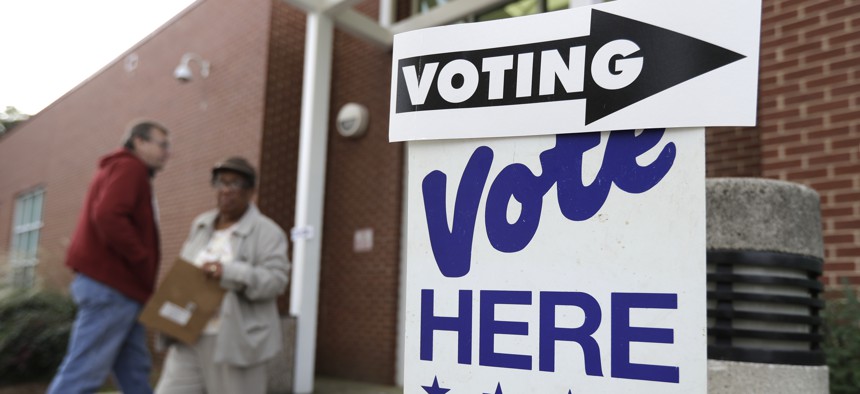When A State Needs an Election Do-Over

An early voting polling place in North Carolina. Voters in the 9th Congressional District may have to go back to the polls for a redo election. AP Photo

Connecting state and local government leaders
Some North Carolina voters could be headed back to the polls.
This story was originally published by Stateline, an initiative of The Pew Charitable Trusts.
Golf has mulligans. Tennis has second serves. But can elections have do-overs?
North Carolina voters might have to go back to the polls in the new year after election officials discovered potential tampering with mail-in ballots in the state’s 9th Congressional District this fall.
It’s not the first time that U.S. voters have had to recast a ballot after previous results were thrown out. Even so, redoing an election is “very unusual,” said Julia Azari, an associate professor of political science at Marquette University.
Electoral mulligans have happened after problems ranging from discrepancies with ballots to deliberate fraud. Redoing elections costs money and time. They can lower turnout in the subsequent election and shatter voters’ belief that elections are free and fair, she said.
“You have to take a leap of faith that either this election was good enough that the results pass muster, or they weren’t and we need to vacate the results,” Azari said. “That’s a very serious undertaking. You have to understand how big it is to invalidate an election.”
Officials in Illinois held a do-over for a state House seat in 2002 after some ballots were left uncounted, a number were lost and others were mistakenly cast by voters outside the Chicago-area district.
In Indiana, the state Supreme Court in 2004 ordered a new mayoral contest in East Chicago after alleged absentee ballot fraud.
And in Connecticut, the Supreme Court in 2006 ordered a new Middletown city council election because of errors by officials.
One of the most high-profile do-overs happened after the 1974 federal election, when two recounts and a U.S. Senate review couldn’t determine a winner to fill a New Hampshire U.S. Senate seat. Democrat John Durkin eventually won the seat in a new election in September 1975 by 27,000 votes.
North Carolina’s congressional race isn’t even the only redo election of 2018. In Georgia, the Republican primary for a state House seat was held twice after election officials gave voters incorrect ballots in the May 22 contest.
In the second election, held Dec. 4, the margin of victory was tighter but the result was the same.
North Carolina’s Board of Elections and Ethics Enforcement has twice refused to certify the 905-vote victory of Republican Mark Harris for the congressional seat because of allegations of mail-in ballot irregularities and potential fraud. Harris beat Democrat Dan McCready in the district that includes parts of the Charlotte suburbs.
The seat will be empty when Congress reconvenes in January. The state elections board is set to hold a public hearing Jan. 11 to present evidence from its investigation into suspected fraud and decide whether to certify the results or order a new election.
The investigation is focused on political operative Leslie McCrae Dowless, a felon who worked for a consulting firm contracted by the Harris campaign. Officials worry Dowless may have discarded Democratic mail-in ballots he collected from voters throughout the congressional district.
Harris and Dowless have denied any wrongdoing. McCready said he is gearing up for a new election.
The need to conduct a new election in North Carolina raises serious concerns about the strength of the state’s political system, said Michael Bitzer, a professor of politics and history at North Carolina’s Catawba College.
“The average voter must now ask, ‘Do I have confidence in the integrity of my vote being cast?’” Bitzer said.
New elections come with high administrative costs — officials must print new ballots, hire election workers and update voting machines. The new election may cost Mecklenburg County as much as $500,000.
Most concerning is the potential plummeting of voter turnout in the new election, said Azari, the Marquette professor who has written about the conundrum of fraudulent elections.
Runoffs and special elections often have low voter turnout. In 190 congressional primary runoffs between 1994 and 2016, voter turnout declined on average by 36 percent, according to analysis by the nonprofit FairVote.
A redo in North Carolina is not a certainty. The elections board still needs a majority vote of the nine-person panel in January. The panel has four Democrats, four Republicans and one unaffiliated member.
State lawmakers in the Republican-controlled General Assembly passed a bill that also called for a new Republican primary election for the congressional district, citing potential wrongdoing in the May election. Harris ousted incumbent GOP Rep. Robert Pittenger in the primary for the 9th District.
But Gov. Roy Cooper, a Democrat, said he will veto the legislation, citing concerns that the bill would keep campaign finance investigations confidential. Republicans, though, hold veto-proof majorities in both houses of the state legislature.
And while the North Carolina Republican Party has said it supports the ongoing investigation, it has criticized the state Board of Elections for holding the hearing more than a week after the new Congress convenes.
“There’s a lot of moving parts to all of this,” Catawba College’s Bitzer said, “and unfortunately a lot of it is breaking down into intense partisan lenses.”




